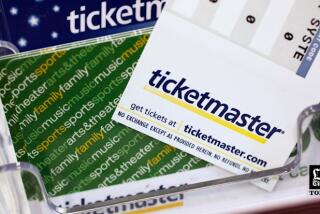Crackdown on ‘Nigerian’ Tickets
- Share via
Many would-be travelers are finding themselves caught in a squeeze play between the airlines, on the one hand, and unscrupulous or naive travel agents on the other.
TWA and Pan Am, for two--and there will be others--have begun to crack down on what have become known as “Nigerian” tickets, although, in truth, they’re thought to be coming into this country from Zambia and maybe Pakistan as well as Nigeria.
The carriers claim that the use of those tickets in the United States is merely the conclusion of an elaborate scheme to defraud them. It ends, alas, with many passengers who bought the tickets in good faith discovering that they may not be allowed to use them except on a standby basis.
Here, briefly, is how the scam works:
To set the action in motion, somebody takes U.S. dollars to, say, Lagos, Nigeria, and converts them on the black market into local currency, naira, at much better than the official exchange rate. With the inflated naira, he or she then buys tickets, in bulk, from the Nigerian national airline.
The trick is to convert that bundle, bought with artificially inflated dollars, into as many “hard” dollars as possible. To do that, the help of travel agents is needed.
The crook brings the tickets back to the United States where the process of “laundering” them begins. The idea, essentially, is to have these tickets reissued on other carriers not once but several times, so that they become difficult to match with the original Nigerian issue.
One of the strengths of the world’s airline system--and in this case, apparently, one of its weaknesses--is the exchangeability of its ticket stock. You can take a ticket written on, say, United, by a Tampa travel agent and have it rewritten in Los Angeles on, say, American.
Later, United refunds American for the price of the travel.
These things are just about as negotiable as cash or checks. The United/American example, of course, is a straight dollar transaction.
Currency Exchange Problem
Internationally, when differing currencies become involved it’s a little less secure, but it’s been done for years, nevertheless. In the case of Nigeria, airlines providing transportation based on tickets issued in that country get paid in naira only, not something they want a lot of.
Then these black market tickets come into this country for “laundering.” There’s plenty of money involved. The originator has a ticket that cost $200--”real” dollars, that is--and, thanks to the black market naira transaction, has a street value of, say, $1,000.
So the first agent who reissues it takes $50 for the effort. And the second who reissues the reissue. And the third who reissues the reissue of . . . well, you get the message.
Now the crook has a $1,000 face-value ticket, thrice removed from the original, that cost only $350. So he or she, or the travel agent, sells it for, say, $800.
That’s a cool $450 profit, more than doubling somebody’s investment in black market naira.
The seller makes a profit. The buyer gets a $200 discount. Everybody’s happy.
Everybody, that is, but the airline that supplies the transportation. What it ends up with is a $1,000 ticket for which it will be paid in currency worthless on the world markets and which, in any case, it is forbidden by law to remove from Nigeria.
Multiply that kind of activity by tens of thousands and you get an idea of the amount of money involved.
There’s no telling how much the airlines have lost, but figures such as $40 million and $50 million are bandied about quite freely by people who sound as if they ought to know. Nor is it just Pan Am and TWA who’ve been ripped off; there’s hardly a major carrier that hasn’t suffered some loss.
Many Airlines Hit
Qantas, for example, has already sued, and sent to prison, a travel agent in Toronto for his part in laundering Nigerian tickets. And others, such as British Caledonian, British Airways, Lufthansa and Air France are known to have been hit.
Travel agents who deal with the frauds, helping push the tickets through the pipeline, are either part of the scam or they’re pretty stupid. Because of the millions of tickets processed by the airline clearinghouse every week, it’s difficult to detect such shenanigans quickly.
But eventually they are detected, and it’s put-up-or-shut-up time for the agents. Dozens of agents in this area have been forced by the airlines to do just that--shut up shop.
Which leaves their clients with those funny tickets the airlines don’t want.
After working on the problem for more than a year, here and in Nigeria, airline security people are satisfied that they have a handle on which agents, and which ticket number sequences, are involved. They are zeroing in on those tickets.
Recently Pan Am ran advertisements listing three dozen or so travel agencies that it suspected had taken part in the scheme, and advising anybody holding tickets issued by one of them to call a special toll-free number to verify the validity of the purchase. Failure to do so, Pan Am warned, could cause the passenger to be denied boarding.
Even people who bought tickets quite innocently found themselves forced to travel standby. Or not travel at all.
Pay Now or Don’t Fly
Now TWA has taken an even stronger stand. It is requiring passengers detected at the counter using Nigerian-originating tickets to buy others or cancel their travel.
The airlines are determined to cut down on losses arising out of this scam.
How can your protect yourself? The first thing to recognize is that, while there are legitimate discount fares to be had, there is a structure, a formula, to be followed.
If anybody offers you an airline ticket at a discount, at a price below that shown on the ticket, question it. If the answers don’t sound right, call the airline.
Don’t buy airline tickets in bars or on street corners. Be wary of a seller who seems willing to negotiate a price; these things aren’t meant to be negotiable, other than perhaps a few dollars that some agents may be willing to rebate from their commissions on certain sales.
If it doesn’t sound right, it probably isn’t. Don’t take chances.
The airlines want you to fly, but they don’t want you to fly unless they get paid. And they don’t consider Nigerian naira an acceptable form of payment for travel provided in this country.
More to Read
Sign up for The Wild
We’ll help you find the best places to hike, bike and run, as well as the perfect silent spots for meditation and yoga.
You may occasionally receive promotional content from the Los Angeles Times.






